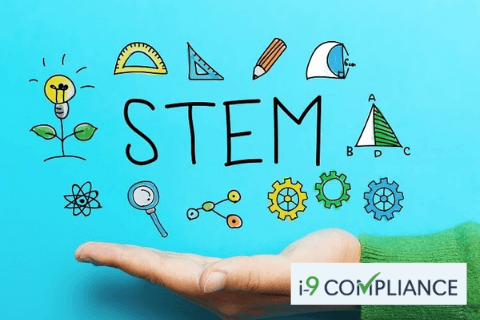Expanded Employment Eligibility for STEM Graduates

The current administration has made some policy changes to expand the opportunities available for STEM (Science, Technology, Engineering, and Math) graduates. This change is being made because of the importance of STEM graduates to the U.S. economy. The current administration made three changes that will increase the employment eligibility of STEM graduates. These changes are:
22 new degree fields have been added to the STEM list. This will allow more F-1 graduates to qualify for three years of optional practical training (OPT) instead of one. STEM students that have J-1 visitor status will be eligible for thirty-six months of optional practical training instead of the current eighteen months. Graduates in STEM fields will have greater eligibility for National Interest Waiver Immigrant (NIW) visas.
The STEM list has been expanded to include degree programs, such as mathematical economics, human-centered technology design, data visualization, climate science, bioenergy, as well as some analytics fields that were not considered to be STEM fields in the past. These include financial analytics, data analytics, and business analytics.
By giving J-1 and F-1 students, who often earn Ph.D. degrees, a longer period of OPT, they have additional time to contribute to United States universities, non-profit institutions, and companies. This opportunity also makes U.S. universities and colleges a more attractive option. Additionally, allowing these students to remain in the United States longer to receive this additional trading reduces the brain drain in this country. Also, students that remain in this country for advanced training may be more likely to want to remain in the U.S. rather than leave and use their expertise in other countries.
However, for these students to be able to remain in the U.S., they need to have a path available to obtain permanent residence or H-1B visas. By allowing STEM graduates three years of STEM training, they have increased opportunities to obtain an H-1B visa through the H-1B lottery.
Applicants need to prove three factors in order to get an NIW. These factors are:
Demonstrate that the suggested project has significant merit and is of national importance. Demonstrate that the applicant has the ability to contribute to the project. Demonstrate that it would be advantageous for the U.S. to forego the requirement for a job offer and, therefore, the labor test.
In order to meet this last factor, the new policy takes into account how important it is to progress in STEM fields and the importance of people with advanced STEM degrees for achieving this progress. This is particularly true for any stem areas that are important for national security or keeping the United States competitive.
SourcesThere’s a smarter way to verify your employment eligibility. I-9 Compliance makes things easier on your end with automation. Start today.